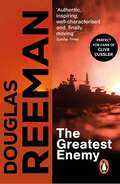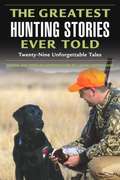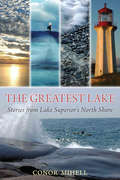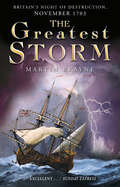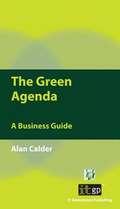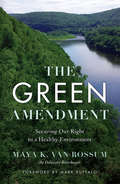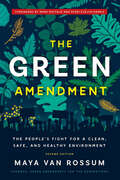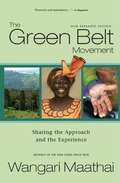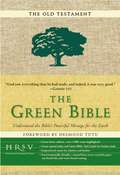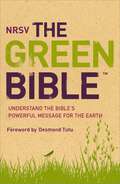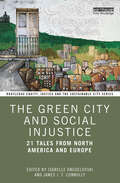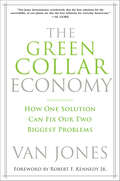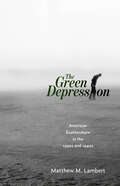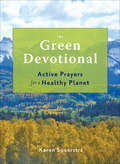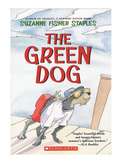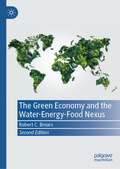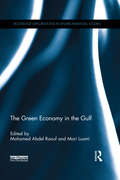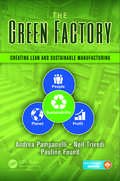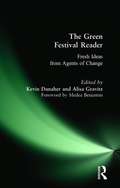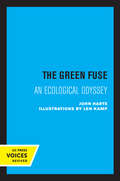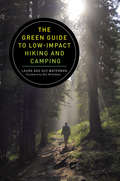- Table View
- List View
The Greatest Enemy: an all-guns-blazing tale of naval warfare from Douglas Reeman, the all-time bestselling master storyteller of the sea
by Douglas ReemanThis compelling nautical adventure from multi-million copy bestselling author Douglas Reeman will have readers of Clive Cussler, Bernard Cornwell and Wilbur Smith gripped with its expertly combined characterisation and vivid battle scenes. You'll feel like you are on the bridge yourself...!'One of our foremost writers of naval fiction' -- Sunday Times'I could not put it down. I enjoyed every single page of this seafaring tale.' -- ***** Reader review'Enthralling - just had to keep reading to the end' -- ***** Reader review'A cracking read' -- ***** Reader review'Exceptional' -- ***** Reader review'Nail biting to the end' -- ***** Reader review****************************************************************************Twenty-five years ago, HMS Terrapin was part of a crack hunter-killer group in the Battle of the Atlantic. Now she is working out her last commission in the Gulf of Thailand.To Lieutenant-Commander Standish, the frigate seems to mark the end of his hopes of a career in the Navy. Then a new captain arrives, a man driven by an old-fashioned, almost obsessive patriotism. And under his stubborn leadership, Standish and the crew discover a long-forgotten unity of purpose...She was one of the deadliest ships of the war. Her greatest heroics may still lie ahead.
The Greatest Hunting Stories Ever Told: Twenty-Nine Unforgettable Tales
by Lamar UnderwoodHunting is a serious business-but it's also about camaraderie, achievements and failures, seeing new places, and revisiting cherished ones. The true stories here feature a variety of game, in locations that range from high Yukon Territory mountain peaks to lowland swamps off of Mobile Bay, Alabama. This is an indispensable volume for all lovers and students of the natural world. If your definition of home includes fields and marshes, creeks and river bottoms, plains and mountains, consider this required reading.
The Greatest Lake: Stories from Lake Superior’s North Shore
by Conor MihellExplore the connection between people and places on the rugged shore of Lake Superior, the world’s largest freshwater lake. Conor Mihell offers a compelling image of Lake Superior’s Canadian shore through colourful personality sketches, adventure stories, and environmental accounts. Admire the kitschy decor of lighthouse cottager Maureen Robertson, a 76-year-old who spends six months of the year alone on a remote island; enter the debate over a controversial aggregate quarry in Wawa, Ontario; and learn how the author’s love affair with the world’s largest freshwater lake began on quests for a near-mystical, glacier-dropped monolith.Mihell’s stories build on Lake Superior’s rich and varied history and support its critical place in Canadian culture. Since the beginning, Lake Superior has been revered for its God-like qualities of power, unpredictability, and a seemingly endless expanse of life-sustaining freshwater. The lake’s rugged yet fragile nature and hardscrabble characters and outpost communities define rural northwestern Canada. Experience it for yourself in this first collection of stories by one of the region’s most acclaimed journalists.
The Greatest Storm: Britain's Night of Destruction, November 1703
by Martin BrayneAll but forgotten now, the Great Storm of 26/27 November 1703 was the worst storm experienced in recorded history in the British Isles. Over 8000 people died and the losses of property and shipping were immense. Martin Brayne tells in vivid detail the story of this tragic and catastrophic event. While almost everyone knows something about those two classic disaster scenarios of the Stuart age, the Great Fire of 1666 and the Great Plague of the year before, hardly anyone knows the story of the Great Storm of 1703, the worst that has occurred in the British Isles. Winds and rain lashed the entire country and floods were reported almost everywhere. Famously, Henry Winstanley had the misfortune to be in the wooden lighthouse which he had designed on Eddystone Rocks of Plymouth on 26 November 1703. The lighthouse was destroyed and Winstanley died.
The Greek's One-Night Heir: Her Sicilian Baby Revelation / The Greek's One-night Heir (Mills And Boon Modern Ser.)
by Natalie AndersonA chemistry-filled contemporary romance from USA TODAY bestselling author Natalie Anderson.The billionaire comes with rules…She&’s broken them all—by getting pregnant!When tycoon Theo sees security footage of a woman requesting to speak with him, he recognizes Leah Turner instantly. They spent an astonishing night together, and he&’s been trying—failing—to forget her since. What could she possibly want?Leah&’s baby bombshell floors Theo…and his marriage proposal stuns her! She trusted him with her virginity, and she knows she can trust Theo with their unborn child. Their chemistry is undeniable, but can Leah trust this brooding Greek to give her anything more?From Harlequin Presents: Escape to exotic locations where passion knows no bounds
The Green Agenda: A Business Guide
by Alan Calder'Climate change', 'global warming' and, before that, 'the new ice age' have all been fashionably topical issues about which individuals and organizations have worried themselves over the course of the last twenty years or so. This guide was written to introduce, to a business audience, the opposing groups and the key climate change concepts, to provide an overview of a Green IT strategy and to set out a straightforward, bottom line-orientated Green IT action plan. The fact that this will also enable the organization to comply with the growing range of ecologically- focused range of regulations is an additional benefit!
The Green Amendment: Securing Our Right to a Healthy Environment
by Rossum Maya VanThe Constitutional Change We Need to Protect Our Priceless Natural ResourcesFor decades, activists have relied on federal and state legislation to fight for a cleaner environment. And for decades, they've been fighting a losing battle. The sad truth is, our laws are designed to accommodate pollution rather than prevent it. It's no wonder people feel powerless when it comes to preserving the quality of their water, air, public parks, and special natural spaces.But there is a solution, argues veteran environmentalist Maya K. van Rossum: bypass the laws and turn to the ultimate authority—our state and federal constitutions.In 2013, van Rossum and her team won a watershed legal victory that not only protected Pennsylvania communities from ruthless frackers but affirmed the constitutional right of people in the state to a clean and healthy environment. Following this victory, van Rossum inaugurated the Green Amendment movement, dedicated to empowering every American community to mobilize for constitutional change.Now, with The Green Amendment, van Rossum lays out an inspiring new agenda for environmental advocacy, one that will finally empower people, level the playing field, and provide real hope for communities everywhere. Readers will discover:• how legislative environmentalism has failed communities across America,• the transformational difference environmental constitutionalism can make,• the economic imperative of environmental constitutionalism, and• how to take action in their communities.We all have the right to pure water, clean air, and a healthy environment. It's time to claim that right—for our own sake and that of future generations.
The Green Amendment: The People's Fight for a Clean, Safe, and Healthy Environment
by Maya K. van RossumA veteran environmentalist shares her roadmap to a healthier world—one that uses the law to empower activists and provide hope for communities everywhere.We have reached a critical tipping point in our fight for the environment: Corporations profit off climate change, natural disasters devastate homes, and the most vulnerable suffer the health effects of pollution. Yet our laws are designed to accommodate this destruction rather than prevent it. Without government support, it's no wonder people feel powerless.But there is a solution. In The Green Amendment, veteran environmentalist Maya K. van Rossum presents her radically simple plan for a green future: bypass local laws and turn to the ultimate authority—our state and federal constitutions—to ensure we have the right to a healthy environment.Through compelling interviews with activists on the ground, clear evidence from experts, and heartbreaking stories from those hit hardest by environmental ruin, The Green Amendment lights the path forward. In this updated edition of her trailblazing 2017 book, van Rossum invites readers to join the movement by sharing:Why Green Amendments work where other movements have failedHow to position Green Amendments and what specific language offers the strongest legal protectionsHow to argue in favor of environmental rights, and the economic and health benefits that will help activists make the caseHow Green Amendments address the crucial intersection of environmentalism and anti-racismWhat everyone—from artists and students to scientists and lawyer—can do to further the causeWith the power of The Green Amendment, we can claim our environmental rights, ensuring a clean, safe Earth for generations to come.
The Green Archipelago: Forestry in Preindustrial Japan
by Conrad TotmanEvery foreign traveler in Japan is delighted by the verdant forest-shrouded mountains that thrust skyward from one end of the island chain to the other. The Japanese themselves are conscious of the lush green of their homeland, which they sometimes refer to as midori no rettō, "the green archipelago." At first glance Japan seems to be a world of primeval forests, a gorgeous natural creation reflecting that frequently mentioned Japanese love of nature. In fact, the abundant verdure is not a monument to nature's benevolence and Japanese aesthetic sensibilities but the hard-earned result of generations of human toil that have converted the archipelago into one great forest preserve.
The Green Belt Movement
by Wangari MaathaiWhen Kenyan environmental and democracy activist Wangari Maathai became the first African woman to receive the Nobel Peace Prize in 2004, she capped a life full of firsts. She was the first African woman to earn a Ph.D. in Eastern and Central Africa, and the first woman to attain associate profes¬sorship and to hold a department chair at the University of Nairobi. In 1977, shocked at the environmental devastation caused by deforestation in her beloved Kenya, Maathai founded the Green Belt Movement (GBM). For twenty-seven years, GBM has enabled many people-particularly women-to plant trees in their regions, providing them with food and fuel, and halting soil erosion and desertification. GBM became much more than that, however. It became a movement for representative democracy that led to Kenya's 'first fully democratic elections in a generation, during which Maathai was elected to Parliament and made a minister for the environment. The Green Belt Movement: Sharing the Approach and the Experience is the story of the Green Belt Movement in Wangari Maathai's own words. It reveals the struggles and the structure of this extraordinary effort to reforest a vast region and free a people. Over the course of its history, nearly 30 million trees have been planted, and tens of thousands of people have earned a livelihood. The Green Belt Movement is the inspiring story of people working at the grassroots level to improve their environment and their country. Their story offers ideas about a new and hopeful future for Africa and the rest of the world.
The Green Bible--Old Testament
by Harper BiblesThe Green Bible will equip and encourage you to see God's vision for creation and help you engage in the work of healing and sustaining it. This first Bible of its kind includes inspirational essays from key leaders such as N. T. Wright, Barbara Brown Taylor, Brian McLaren, Matthew Sleeth, Pope John Paul II, and Wendell Berry. As you read the scriptures anew, The Green Bible will help you see that caring for the earth is not only a calling, but a lifestyle.
The Green Bible: A Book Of Daily Readings
by Harper BiblesIs God green? Did Jesus have anything to say about the environment? With over 1,000 references to the earth in the Bible, the message is clear. All of God's creation-nature, animals, and humanity-are inextricably linked to one another. As creation cares for us, we too are called to care for creation and engage in the work of healing and sustaining it. Read the scriptures anew with The Green Bible as your guide and discover how caring for the earth is not only a calling, but also a lifestyle. Special features: Green-letter edition-over 1,000 verses highlighted Green topical index and "The Green Bible Trail Guide" for further study Inspirational essays by scholars and leaders such as N. T. Wright, Barbara Brown Taylor, and Brian McLaren Environmentally friendly-recycled paper and soy-based ink
The Green Book: The Everyday Guide to Saving the Planet One Simple Step at a Time
by Elizabeth Rogers Thomas M. KostigenWater is the biggest environmental issue facing us today. It's a resource we can't live without, yet most of us take it for granted as we brush, flush, and consume water seemingly without limit. We hose our driveways and over water our lawns. But all of that is about to change; we're quickly running out of our freshwater supply.
The Green City and Social Injustice: 21 Tales from North America and Europe (Routledge Equity, Justice and the Sustainable City series)
by Isabelle Anguelovski and James J. T. ConnollyThe Green City and Social Injustice examines the recent urban environmental trajectory of 21 cities in Europe and North America over a 20-year period. It analyses the circumstances under which greening interventions can create a new set of inequalities for socially vulnerable residents while also failing to eliminate other environmental risks and impacts. Based on fieldwork in ten countries and on the analysis of core planning, policy and activist documents and data, the book offers a critical view of the growing green planning orthodoxy in the Global North. It highlights the entanglements of this tenet with neoliberal municipal policies including budget cuts for community initiatives, long-term green spaces and housing for the most fragile residents; and the focus on large-scale urban redevelopment and high-end real estate investment. It also discusses hopeful experiences from cities where urban greening has long been accompanied by social equity policies or managed by community groups organizing around environmental justice goals and strategies. The book examines how displacement and gentrification in the context of greening are not only physical but also socio-cultural, creating new forms of social erasure and trauma for vulnerable residents. Its breadth and diversity allow students, scholars and researchers to debunk the often-depoliticized branding and selling of green cities and reinsert core equity and justice issues into green city planning—a much-needed perspective. Building from this critical view, the book also shows how cities that prioritize equity in green access, in secure housing and in bold social policies can achieve both environmental and social gains for all.
The Green Collar Economy: How One Solution Can Fix Our Two Biggest Problems
by Van Jones“Steadily—by redefining green—Jones is making sure that our planet and our people will not just survive but also thrive in a clean-energy economy.”—Leonardo DiCaprioA New York Times bestseller, The Green Collar Economy by award-winning human rights activist and environmental leader Van Jones delivers a much-needed economic and environmental solution to today’s two most critical problems. With a revised introduction and new afterword by the author—a man who counsels President Barack Obama on environmental policy—The Green Collar Economy and Jones have been highly praised by a multitude of leaders and legislators, including Al Gore, Senator Tom Daschle, and Speaker of the House Nancy Pelosi. Van Jones was named one of “The World’s 100 Most Influential People of 2009”by Time magazine, and with The Green Collar Economy he offers a wise, necessary, and eminently achievable plan for saving the earth and rescuing working class Americans.
The Green Depression: American Ecoliterature in the 1930s and 1940s
by Matthew M. LambertDust storms. Flooding. The fear of nuclear fallout. While literary critics associate authors of the 1930s and ’40s with leftist political and economic thought, they often ignore concern in the period’s literary and cultural works with major environmental crises. To fill this gap in scholarship, author Matthew M. Lambert argues that depression-era authors contributed to the development of modern environmentalist thought in a variety of ways. Writers of the time provided a better understanding of the devastating effects that humans can have on the environment. They also depicted the ecological and cultural value of nonhuman nature, including animal “predators” and “pests.” Finally, they laid the groundwork for “environmental justice” by focusing on the social effects of environmental exploitation. To show the reach of environmentalist thought during the period, the first three chapters of The Green Depression: American Ecoliterature in the 1930s and 1940s focus on different geographical landscapes, including the wild, rural, and urban. The fourth and final chapter shifts to debates over the social and environmental effects of technology during the period. In identifying modern environmental ideas and concerns in American literary and cultural works of the 1930s and ’40s, The Green Depression highlights the importance of depression-era literature in understanding the development of environmentalist thought over the twentieth century. This book also builds upon a growing body of scholarship in ecocriticism that describes the unique contributions African American and other nonwhite authors have made to the environmental justice movement and to our understanding of the natural world.
The Green Devotional: Active Prayers for a Healthy Planet
by Karen SpeerstraOur planet, our home, is in crisis plain and simple and this collection of quotes, poems, essays, and prayers will inspire all to actively reverse the man-made cause of global warming, stem the tide of environmental destruction, and reconnect to the good earth. Short essays of topical interest introduce each of the eight sections of this book, and the 250 voices inside, most of them contemporary, begin to harmonize together as they seem to call out for their own canonical structure -- one bounded by the ancient elements: Earth, Air, Fire, Water. This collection of voices is like a "green book of devotional hours," reminiscent of the Books of Hours medieval people used to hold in their palms. It was called "a cathedral in your hands. " And like that medieval book, The Green Devotionalreminds us that we are connected to something broader and wiser than ourselves.
The Green Dog: A Mostly True Story
by Suzanne Fisher StaplesMy very own dog... All Suzanne can think of is her dream dog --- black-and-tan, with long silky fur and deep chocolate eyes. So when the perfect dog shows up one day, she is overjoyed. But Jeff, the dog, has a nose for trouble, and keeping him will be more difficult than Suzanne ever imagined.
The Green Economy and the Water-Energy-Food Nexus
by Robert C. BrearsThis book argues that a variety of policies will be required to create synergies between the water-energy-food nexus sectors while reducing trade-offs in the development of a green economy. Despite rising demand for water, energy and food globally, the governance of water-energy-food sectors has generally remained separate with limited attention placed on the interactions that exist between them. Brears provides readers with a series of in-depth case studies of leading cities, states, nations and regions of differing climates, lifestyles and income-levels from around the world that have implemented a variety of policy innovations to reduce water-energy-food nexus pressures and achieve green growth. The Green Economy and the Water-Energy-Food Nexus will be of interest to town and regional planners, resource conservation managers, policymakers, international companies and organisations interested in reducing water-energy-food nexus pressures, environmental NGOs, researchers, graduate and undergraduate students.
The Green Economy in the Gulf: Lessons From The Uae's State-led Energy Transition (Routledge Explorations in Environmental Studies)
by Mohamed Abdel Raouf Mari LuomiFilling a void in academic and policy-relevant literature on the topic of the green economy in the Arabian Gulf, this edited volume provides a multidisciplinary analysis of the key themes and challenges relating to the green economy in the region, including in the energy and water sectors and the urban environment, as well as with respect to cross-cutting issues, such as labour, intellectual property and South-South cooperation.Over the course of the book, academics and practitioners from various fields demonstrate why transitioning into a ‘green economy’ – a future economy based on environmental sustainability, social equity and improved well-being – is not an option but a necessity for the Gulf Cooperation Council (GCC) States. Through chapters covering key economic sectors and cross-cutting issues, the book examines the GCC states’ quest to align their economies and economic development with the imperatives of environmental sustainability and social welfare, and proposes a way forward, based on lessons learned from experiences in the region and beyond.This volume will be of great relevance to scholars and policy makers with an interest in environmental economics and policy.
The Green Edit: Easy tips for the eco-friendly traveller
by Juliet KinsmanExplore the world and satisfy your wanderlust in the most eco-friendly way.How can we lessen our impact on the world without giving up the things we love? This series of easy-to-follow guides show that positive change is possible without radical changes to your everyday life.Sustainable tourism doesn’t have to mean vowing to never take another flight or spending holidays camping in your back garden. This short expert guide from eco-travel journalist Juliet Kinsman, takes you through every step of planning your trip, from booking to boarding, and arms you with everything you need to know for a lower-impact getaway.Whether it's explaining how to know which plane to take (yes, some are greener than others) or how to avoid the mini toiletries trap; this book shows that you can save the planet and still live life to the full.
The Green Factory: Creating Lean and Sustainable Manufacturing
by Pauline Found Andrea Pampanelli Neil TrivediThis book proposes a new model, the Lean and Green Business Model (L&GBM), where the environmental aspect of sustainability is integrated with Lean thinking in order to create a way of thinking that contributes to and balances the three sustainability dimensions of people, profit, and planet. The model presented uses a kaizen approach that will
The Green Festival Reader: Fresh Ideas from Agents of Change
by Kevin Danaher Alisa GravitzThe Green Festivals now draw over 100,000 visitors every year in four U.S. cities. This book collects the most memorable talks from all four festivals on the most urgent social issues of the day.
The Green Fuse: An Ecological Odyssey
by John HarteA widely respected ecological scientist and activist draws on the poet's image and his own environmental research to demonstrate the many interconnections among the world's ecosystems. John Harte takes us from Alaskan salmon runs and the Florida everglades to South Pacific coral reefs and the bleak Tibetan plateau. The result is that rare book that bridges the cultures of science and art. Lyrical, vivid portraits of natural wonders and the threats to them are combined with precise scientific accounts of natural processes and their disturbances. The Green Fuse will show nonscientists the fascination of ecological detective work and renew scientists' love for the beauty of the world under their microscopes. Harte's stories illuminate, without sermonizing, the damage to natural systems brought about by technological hubris and calculated political ruthlessness. "The green fuse" symbolizes the basic unity behind natural diversity. But a fuse may also be the weak link in an overloaded system or the slow burning wick on an ecological bomb. As The Green Fuse reminds us, the energies that created human liberation from nature can also be those that lead to the human destruction of nature. This title is part of UC Press's Voices Revived program, which commemorates University of California Press’s mission to seek out and cultivate the brightest minds and give them voice, reach, and impact. Drawing on a backlist dating to 1893, Voices Revived makes high-quality, peer-reviewed scholarship accessible once again using print-on-demand technology. This title was originally published in 1993.
The Green Guide to Low-Impact Hiking and Camping
by Bill Mckibben Laura Waterman Guy Waterman"A classic of backpacking literature" (Backpacker), now updated with a brand-new foreword by environmentalist and best-selling author Bill McKibben Originally published as Backwoods Ethics in 1979, Laura and Guy Waterman's definitive guide to low-impact hiking and camping was a prophetic call to reevaluate the impact of outdoor recreation on the wilderness. Enthusiastically received by environmentalists and wilderness managers at the time, its warnings and advice are now more relevant than ever. With wisdom and gentle humor, Laura and Guy Waterman present a strong case for the importance of respecting the natural world while you're enjoying it. In his foreword to the new edition, world-famous environmentalist Bill McKibben puts the Watermans' advice into context for today's world. Day hikers, campers, and backpackers who follow the sensible techniques laid out in this book will help preserve the wilderness experience for generations to come.
